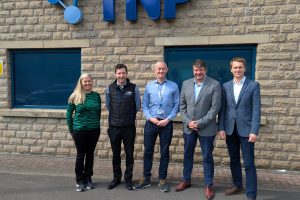Strategy will deliver growth, insists Rafferty
.jpg)
PRINTING.COM’s chief executive Tony Rafferty said he was confident in the growth prospects of both its Brand Demand and Flyerzone services, although both only delivered combined revenues of £370,000 in the year to March 31.
Both services have been set up in a bid to recapture parts of the market which the company felt it was in danger of missing out on – Brand Demand is based on the firm’s “Template” technology and aimed at print materials at branches of large corporates that can be tailored so local messages can be placed within a national brand template – a branch of a high street bank, for instance, printing material to coincide with a local event.
It declared sales of £280,000 for the year, but Rafferty said that these were weighted towards the end of the year and that it made “the best part of £50,000” last month. He also added that building key accounts is a slow process.
Similarly, its Flyerzone division aimed at micro-businesses ordering print supplies made just £90,0000 in sales following a “soft” launch in September, but Rafferty said £40,000 of this occurred in the last month of its financial year.
“You’ve not got to be a genius to work out which way it’s going,” he said, adding that Flyerzone sales had grown by a further 50% since.
“We’re putting that back into the business,” he added.
On Wednesday, Printing.com announced a 28% increase in revenues to £21.8m, although pre-tax profits fell by 4% to £1.3m. UK sales remained flat at around £13.4m, but the company benefitted from the first full year’s contribution from the Media Facility Group (MFG) bought in August 2010 for £1.7m. As a result, turnover in Holland and Belgium more than doubled to £7.3m (£2.6m).
Mr Rafferty said that the he and his board had faced criticism when making the acquisition of the Dutch firm in August 2010, with some shareholders claiming that the firm had lost its way and had fallen back on acquisitions as a method of continuing growth.
Although the firm’s revenue growth would undoubtedly have looked considerably weaker without the contribution from MFG, Mr Rafferty points to the company’s first growth in earnings before interest, tax, depreciation and amortisation (ebitda) in four years as evidence that the deal had made sense. He also argues that costs such as depreciation and amortisation have peaked as the firm has been writing down acquisition and software development costs.
“Even on the assumption that we maintain our spending on software, we expect that pre-tax profits will more closely mirror earnings,” he argued.
He added that the company is now virtually debt-free, with just £100,000 owed by one of its Dutch subsidiaries. Net funds increased by more than £500,000 to finish the year at £1.8m.
“Even if we do the same business as last year, we should make an extra £600,000 of cash,” he said. “That’s not the worst base for moving forwards.”








